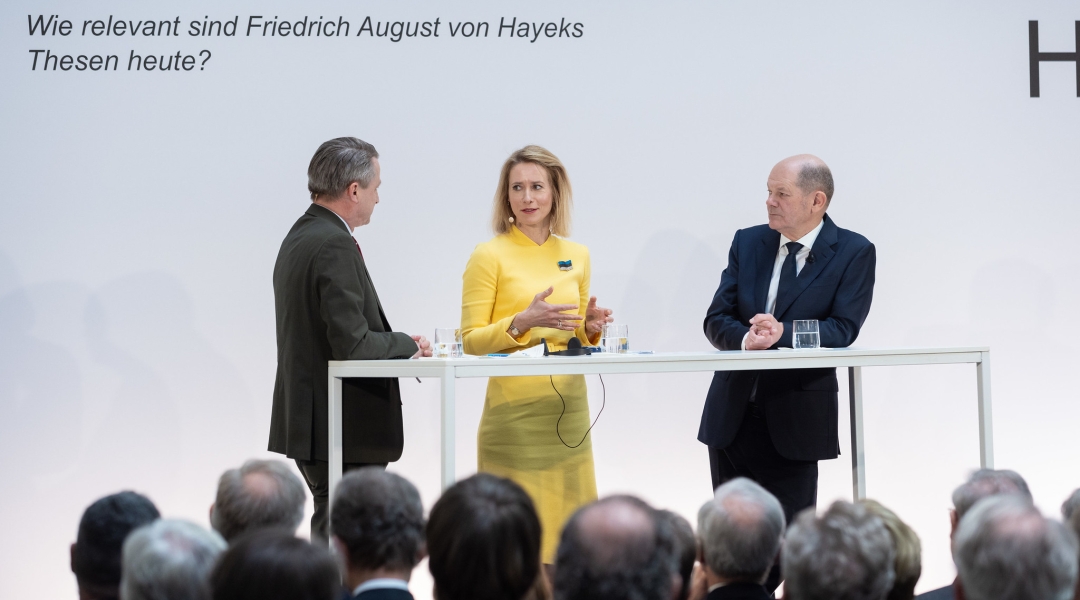At the meeting, Prime Minister Kallas acknowledged Germany’s significant role in supporting Ukraine and ensuring European security. “There have been more changes in the two years since the Zeitenwende than in the 30 years before it. Today, Germany is closer than ever to Estonia and the Baltic states. This is reflected in our bilateral relations as well as in our cooperation within the European Union and NATO,” she said. Kallas also thanked Scholz for Germany’s commitment to the defence of the Baltic region. “Germany is the framework country of the NATO battlegroup in Lithuania, the German navy plays a leading role in the Baltic Sea, and German aircraft defend the airspace here,” she added.
At the meeting, Kallas also stressed the need to invest more in Europe’s defence capabilities and to get the defence industry running at a faster pace – this is essential in ensuring the security of Europe, but also in supporting Ukraine. “We have a choice: either we invest more in defence or risk the future of the free world as a whole. In order to make such large and urgent investments, a shared EU loan, in addition to increasing defence spending, is an option,” Kallas said.
Kallas stressed at the meeting that the military, political, and economic support for Ukraine from the free world must remain unwavering. “Ukraine urgently needs arms and ammunition as well as our long-term support. Estonia’s decision to devote 0.25% of its GDP to military support for Ukraine over the next four years is gaining support among other countries. I also presented our strategy to Chancellor Scholz at our meeting,” said Kallas.
Estonia and Germany agree that profits from frozen Russian assets should be used to support Ukraine. “But we need to find a way to use the frozen assets themselves to help Ukraine,” Kallas said.
Prime Minister Kallas and Chancellor Scholz also shared the stage at a conference organised by the Friedrich August von Hayek Foundation to mark the 80th anniversary of the publication of “The Road to Serfdom”, the popular work by the influential economist Hayek.
In her speech at the Hayek conference, Kallas stressed that we need to try to find a new normal in economic policy after several crises. “We need to make sure that the subsidies intended to alleviate the crisis and the resulting budget deficits do not become a permanent feature. After the crises, we need to return to the previous principles, which have already proven themselves in history. This also requires setting realistic and sustainable targets,” said Kallas.
In her speech, Kallas also highlighted the impact of misinformation and propaganda and the danger it poses to our societies. “The frontline of Putin’s so-called shadow war runs through the hearts of our own democracies. It aims to create mistrust, discourage us from supporting Ukraine, and influence democratic decision-making. We must be particularly vigilant this year, with important elections taking place both in Europe and the United States,” Kallas stressed. “The Kremlin’s disinformation is reaching wide audiences via social media; it sits literally within our pockets, phones, and apps. Truth becomes increasingly more difficult to find,” she added.
Prime Minister Kallas also met with German President Frank-Walter Steinmeier yesterday to discuss support for Ukraine and boosting Europe’s defence capabilities.
Address by Prime Minister Kallas (in English) at the Hayek Conference: https://valitsus.ee/en/news/address-prime-minister-kaja-kallas-hayek-conference
Photos: https://www.flickr.com/photos/stenbockimaja/albums/72177720315533330/
